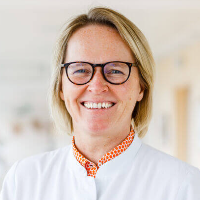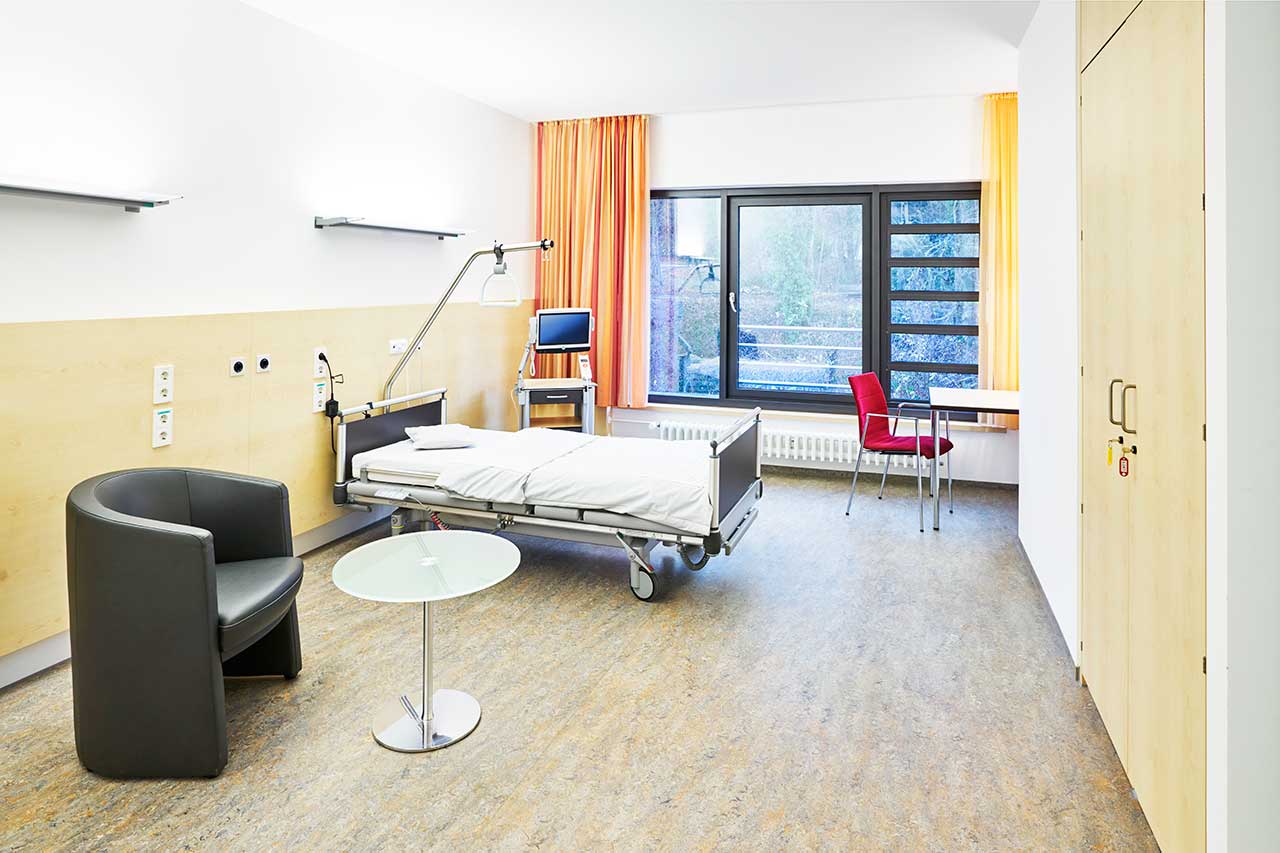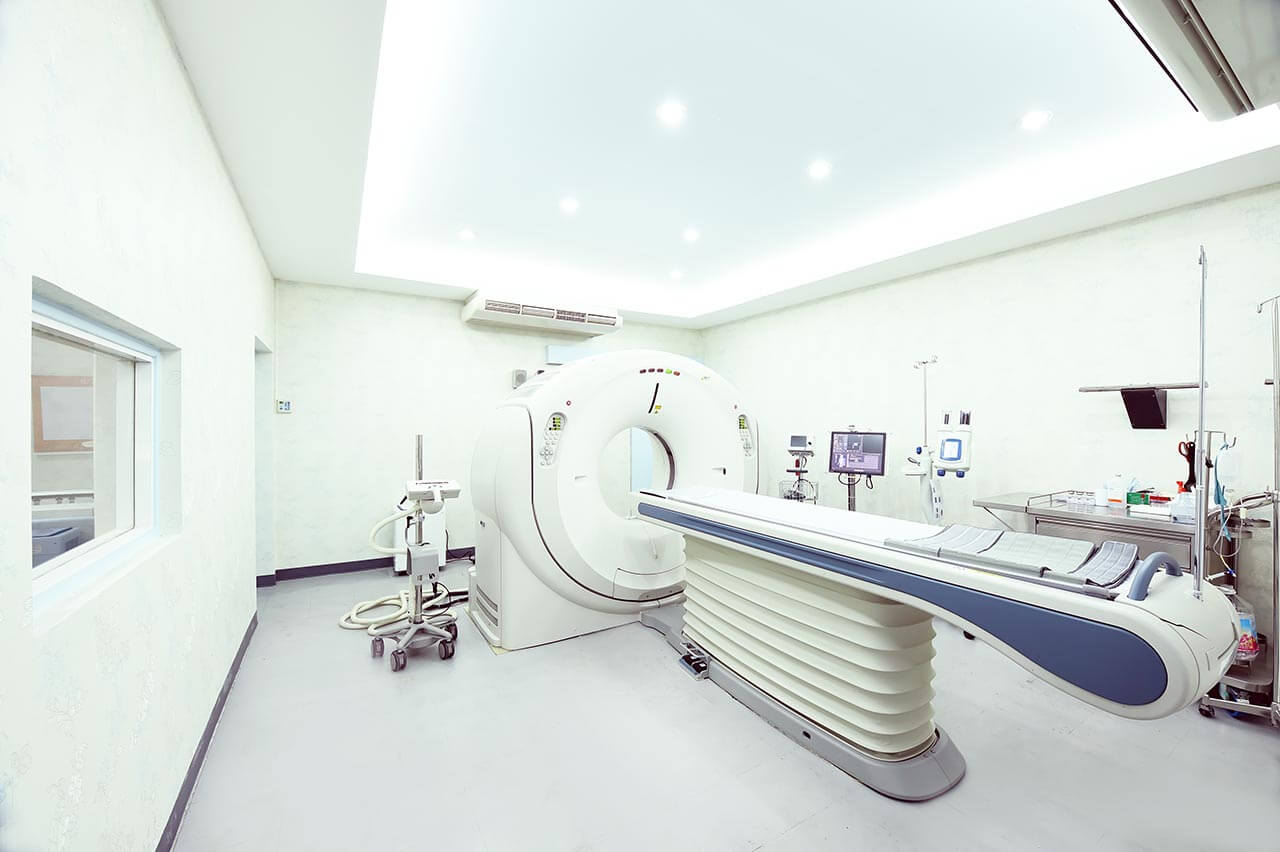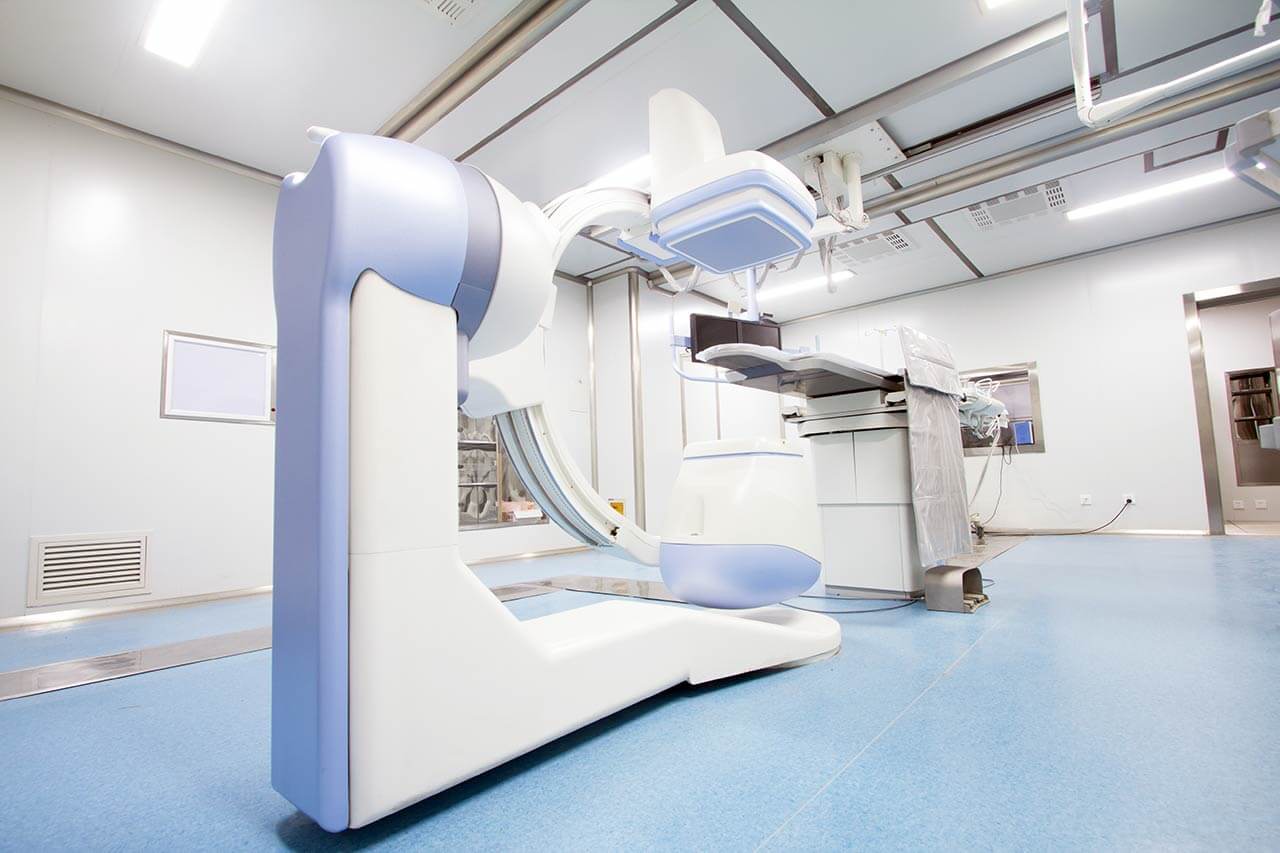
The program includes:
- Initial presentation in the clinic
- clinical history taking
- review of medical records
- physical examination
- laboratory tests:
- complete blood count
- biochemical blood analysis
- inflammation indicators (CRP, ESR)
- alpha-1-antitrypsin
- x-ray and bronchography
- electrocardiogram (ECG)
- high-resolution computed tomography (HRCT)
- collected three sputum samples
- pulmonary function test
- blood gas analysis
- bronchoscopy with biopsy
- histological and microbiological examination
- bronchial lavage
- nursing services
- development of individual treatment plan
Required documents
- Medical records
- Chest X-ray, MRI/CT scan (if available)
Service
You may also book:
 BookingHealth Price from:
BookingHealth Price from:
About the department
The Department of Pulmonology at the Augustinerinnen Hospital Cologne offers the full range of modern medical services to patients with respiratory diseases. The medical facility has well-equipped diagnostic rooms where patients can undergo pulmonary function tests, imaging tests of the chest organs, and endoscopic examinations. The department’s specialists have unique experience in the treatment of chronic obstructive pulmonary disease, bronchial asthma, interstitial lung disease, infectious lesions of the respiratory system, and pleural diseases. In addition, the department's doctors specialize in the treatment of sleep-related breathing disorders (special focus on the care of patients with obstructive sleep apnea and central sleep apnea) and long-term non-invasive ventilation. The department has state-of-the-art diagnostic and therapeutic techniques, ensuring the recovery of patients even in the most complex clinical cases. The department annually admits more than 2,100 inpatients, and a large number of people receive consultations on an outpatient basis. The department is headed by Dr. med. Urte Sommerwerck.
One of the department's priority focuses is the diagnosis and treatment of chronic obstructive pulmonary disease, in particular advanced stages of COPD and pulmonary emphysema. Along with drug therapy, patients are offered non-drug methods, including non-invasive artificial ventilation, long-term oxygen therapy, and endobronchial lung volume reduction. Physiotherapeutic measures are also included in the treatment regimen. These may be breathing exercises, inhalation therapy, or endurance training.
The key tasks of the department's medical team include the diagnosis and treatment of interstitial lung disease. Pathologies in this spectrum affect tissues adjacent to the pulmonary alveoli, which can subsequently provoke fibrosis. This condition causes the formation of lung scars. Should interstitial lung disease be suspected, the department's doctors carry out comprehensive diagnostics, including pulmonary function tests, a chest CT scan, bronchoscopy with a subsequent biopsy, and bronchoalveolar lavage. As for the treatment, individually selected drugs, oxygen therapy, and physiotherapy are most often combined.
The department's specialists often treat patients with malignant lung and pleural diseases. The availability of advanced endoscopic and imaging techniques allows for the detection of a tumor and the determination of its type and stage of cancer as accurately as possible. Once a week, special interdisciplinary tumor boards are held in the department, where personalized treatment regimens are developed for patients with pulmonary cancer. Oncologists, radiologists, radiation therapists, and surgeons participate in these tumor boards.
The department has a wealth of experience in the instrumental treatment of severe breathing disorders caused by diseases of the lungs, nervous system, or musculoskeletal system. The medical facility also houses a specialized section for non-invasive ventilation.
The medical facility also has a Weaning Center certified by the German Society for Pneumology and Respiratory Medicine. The center has 16 beds, admits patients from hospitals in other regions, and successfully weans patients from ventilation. When immediate weaning from the ventilation is impossible, patients are monitored at a specialized unit for long-term mechanical ventilation. In addition, the department cooperates closely with intensive care services for non-invasive ventilation at home. More than 130 patients receive top-class medical services here every year.
The department's key clinical focuses include:
- Diagnostics and treatment of chronic obstructive pulmonary disease, including bronchial asthma
- Diagnostics and treatment of interstitial lung disease
- Diagnostics and treatment of infectious lung diseases: acute bronchitis, pneumonia, pleurisy, tuberculosis (including multidrug-resistant forms), and others
- Diagnostics and treatment of lung diseases caused by immunodeficiency disorders and autoimmune diseases
- Diagnostics and treatment of pulmonary hypertension
- Diagnostics and treatment of occupational lung diseases: silicosis, asbestosis, and others
- Diagnostics and treatment of pleural diseases: pneumothorax, pleurisy, and pleural empyema (in collaboration with thoracic surgeons)
- Diagnostics and treatment of benign and malignant tumors of the lungs, bronchi, pleura, diaphragm, mediastinal organs, chest wall tumors, and chest deformities (in collaboration with thoracic surgeons)
- Diagnostics and treatment of sleep-related breathing disorders: obstructive sleep apnea, central sleep apnea, and insomnia
- Diagnostics and treatment of other diseases
The department specializes in the following diagnostic and therapeutic procedures:
- Diagnostics
- Pulmonary function tests, including body plethysmography, assessment of lung diffusion capacity and the state of the respiratory muscles, and blood gas analysis
- Imaging tests
- X-ray scans
- Lung ultrasound scans
- Chest CT scans
- Bronchoscopy
- Videobronchoscopy
- Rigid and flexible bronchoscopy
- Transbronchial biopsy
- Bronchoalveolar lavage
- Endobronchial ultrasound (EBUS)
- Treatment
- Drug therapy
- Oxygen therapy
- Inhalation therapy
- Breathing exercises
- Bronchoscopic therapeutic procedures
- Foreign body removal
- Stent implantation of stenosis and obstruction in the respiratory system
- Argon plasma coagulation
- Hemostasis for pulmonary hemorrhage
- Endoscopic lung volume reduction
- Other diagnostic and therapeutic procedures
Curriculum vitae
Higher Education
- 1987 - 1990 Medical studies and 1st State Examination, Christian Albrecht University of Kiel.
- 1990 - 1993 Medical studies and admission to medical practice, Eberhard Karl University of Tuebingen.
Board Certification and Additional Qualifications
- Board certification in Internal Medicine.
- Board certification in Pulmonology.
- Additional qualification in Intensive Care.
- Additional qualification in Allergology.
- Additional qualification in Somnology.
Professional Career
- 1994 - 2000 Assistant Physician, Specialized Pulmonary Clinic Ruhrland Essen.
- 2004 - 2011 Senior Physician, Department of Pulmonology, Specialized Pulmonary Clinic Ruhrland Essen.
- 2011 - 2015 Managing Senior Physician, West German Lung Center, University Hospital Essen.
- 2015 - 2017 Medical Director at the St. Vinzenz Hospital Braunschweig, Head Physician, Department of Pulmonology at the St. Vinzenz Hospital Braunschweig.
- 2017 - 2019 Managing Senior Physician, Lung Center, Helios University Hospital Wuppertal.
- Since 2019 Head Physician, Department of Pulmonology, Augustinerinnen Hospital Cologne.
Clinical Focuses
- Development of an interdisciplinary concept for the diagnosis and treatment of incurable lung diseases.
- Medical care for patients after lung transplant surgery.
Awards and Prizes
- Wilhelm und Ingeborg Roloff Prize.
Photo of the doctor: (c) Krankenhaus der Augustinerinnen
About hospital
According to the reputable Focus magazine, the Augustinerinnen Hospital Cologne ranks among the top medical facilities in North Rhine-Westphalia!
The medical facility is an academic hospital of the University of Cologne, thanks to which it provides patients with highly effective treatment using the latest medical advances. The history of the hospital dates back to more than 140 years, so it is not surprising that the medical center enjoys an excellent reputation throughout Germany and is deservedly proud of its successful clinical activities. The hospital's priority focuses are pulmonology, cardiology, gastroenterology, general surgery, abdominal surgery, thoracic surgery, trauma surgery, orthopedics, gynecology, obstetrics, and radiology. About 13,000 inpatients and more than 16,000 outpatients are treated here every year.
The high-tech equipment, active cooperation of specialists within the hospital and with external medical partners, and high competence and motivation of doctors form a solid foundation for providing medical services in accordance with international standards. The hospital regularly takes measures for quality control and medical service optimization.
Only modern and reliable treatment methods are used at the hospital, the effectiveness of which has been confirmed during clinical trials. Minimally invasive surgical techniques, including laparoscopy, endoscopy, video-assisted thoracoscopic surgery (VATS), and image-guided interventional techniques are applied for surgical interventions.
The hospital’s work is based on Christian beliefs, and therefore all patients and their loved ones are surrounded by care and a respectful and sympathetic attitude. The attending physicians devote much time to counseling patients. All this positively affects favorable treatment outcomes.
Photo: (с) depositphotos
Accommodation in hospital
Patients rooms
The patients of the Augustinerinnen Hospital Cologne live in single and double rooms. All patient rooms have comfortable furnishings and are designed in light colors. The standard patient room furnishings include an automatically adjustable bed, a bedside table with a pull-out tray, a wardrobe, a table, chairs, a TV, and a telephone. Wi-Fi is also available in the patient rooms.
Patients can also stay in enhanced-comfort rooms. These patient rooms have upholstered furniture, a mini-bar, and a safe. The bathroom in the enhanced-comfort rooms is equipped with an illuminated cosmetic mirror, toiletries, a hairdryer, changeable towels, and a bathrobe.
Meals and Menus
Patients and their accompanying persons are offered three meals a day, with several menus to choose from. If, for some reason, you do not eat all the foods, you will be offered an individual menu. Please inform the medical staff about your dietary preferences prior to treatment.
Patients staying in enhanced-comfort rooms are offered a special menu including Mediterranean cuisine, fitness salads, pasta, whole-grain pastries, etc. Fresh fruits are also served in enhanced-comfort rooms, and tea or coffee is available at any time of the day.
Further details
Standard rooms include:
Religion
There is a chapel on the territory of the hospital, in which Catholic worship services are held every Sunday at 9:00. Patients can also visit the chapel and pray at any time.
The services of representatives of other religions are available upon request.
Accompanying person
Your accompanying person may stay with you in your patient room or at the hotel of your choice during the inpatient program.
Hotel
You may stay at the hotel of your choice during the outpatient program. Our managers will support you for selecting the best option.





